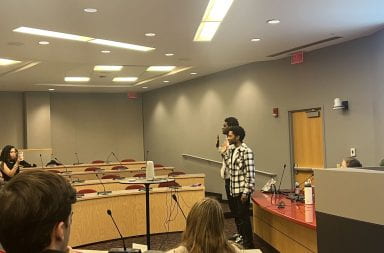The federal government allocates only 1.4 percent to the international affairs budget, but the international relationships cultivated through that investment have an impact in Ohio and for students at Ohio State, said retired Lieutenant General Daniel W. Christman on Tuesday.
Christman, a senior counselor for the U.S. Chamber of Commerce, spoke to a crowd of roughly 80 students and faculty about the importance of Smart Power diplomatic strategy in the U.S. and central Ohio.
Smart Power is an effort to build relationships with developing nations, especially in key strategic regions such as Africa, the Middle East and East Asia, in order to secure economic growth and national security.
“The idea of boots on the ground, of using defense as our first line for ensuring protection (of) our security is, I think, generally understood,” Christman said. “But what is increasingly recognized is that you can’t do it with boots on the ground alone. Smart Power complements boots on the ground with diplomats and with development.”
The global development Smart Power facilitates creates economic development across the country including in Ohio, Christman said. The vast difference between U.S. exports and imports has hit manufacturing economies like Ohio particularly hard.
“We have roughly 50 million American workers, which comprises almost 40 percent of our labor force, that is directly or indirectly associated with companies that engage with overseas markets,” Christman said.
Despite the significance of international affairs, Christman said Congress has proposed a 30 percent reduction in the international affairs budget.
Charles Wise, professor and director of the John Glenn School of Public Affairs at OSU, said a Smart Power strategy has its downsides.
“Part of the cost of Smart Power is that it is not quick, it’s long,” Wise said, describing the long-term investment the strategy requires.
But that investment can have a real impact on the growth of the U.S. economy, especially here in Ohio. According to the U.S. Trade and Development Agency, which is supported by international affairs funding, $35 in U.S. exports results from every $1 invested by the USTDA.
Ohio is the eighth-largest exporting state in the country. Christman said a Smart Power strategy has the potential to increase foreign demand for U.S. goods and help create jobs in exporting states like Ohio.
Beyond the immediate effects of Smart Power, Christman said students benefit from international cooperation and education to compete in the 21st century’s global economy.
“As these students here at Ohio State continue to professionally develop in their own careers, we have to make sure they understand the global environment in which the U.S. competes,” Christman said.
Popular programs among recent college grads, like the Peace Corps, are partially funded through the international affairs budget. Christman said the U.S. has to keep investing in those areas to grow a competitive workforce in the 21st century.
“Other countries are making that investment and unless we do we’re going to fail,” Christman said.
Marilyn Brown, Franklin County Commissioner and member of the U.S. Global Leadership Council Advisery Committee, shared that sentiment.
“We need to be connected to the global community and the global marketplace,” Brown said. “You need to be able to understand the cultural traditions and global conditions that make our world what it is.”
The non-profit organization, U.S. Global Leadership Coalition, hosted the lecture that was held Tuesday at the Columbus Athletic Club.


